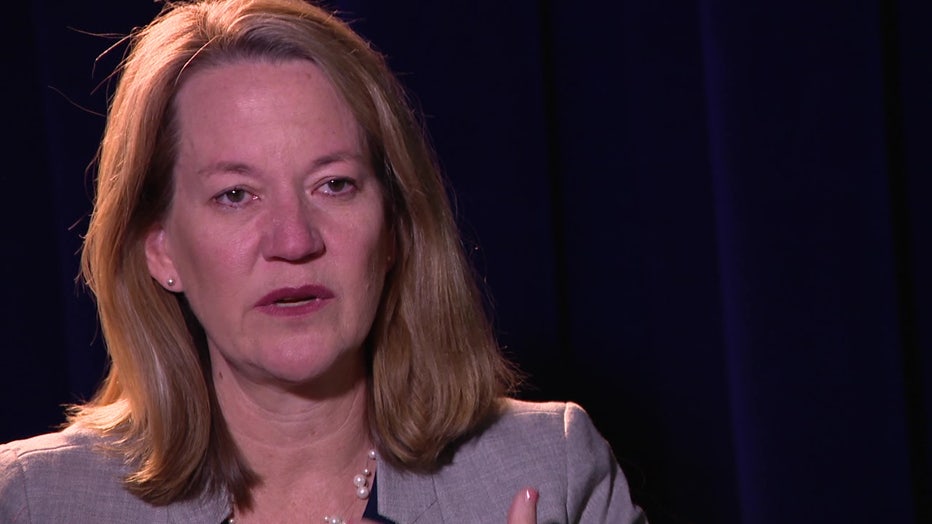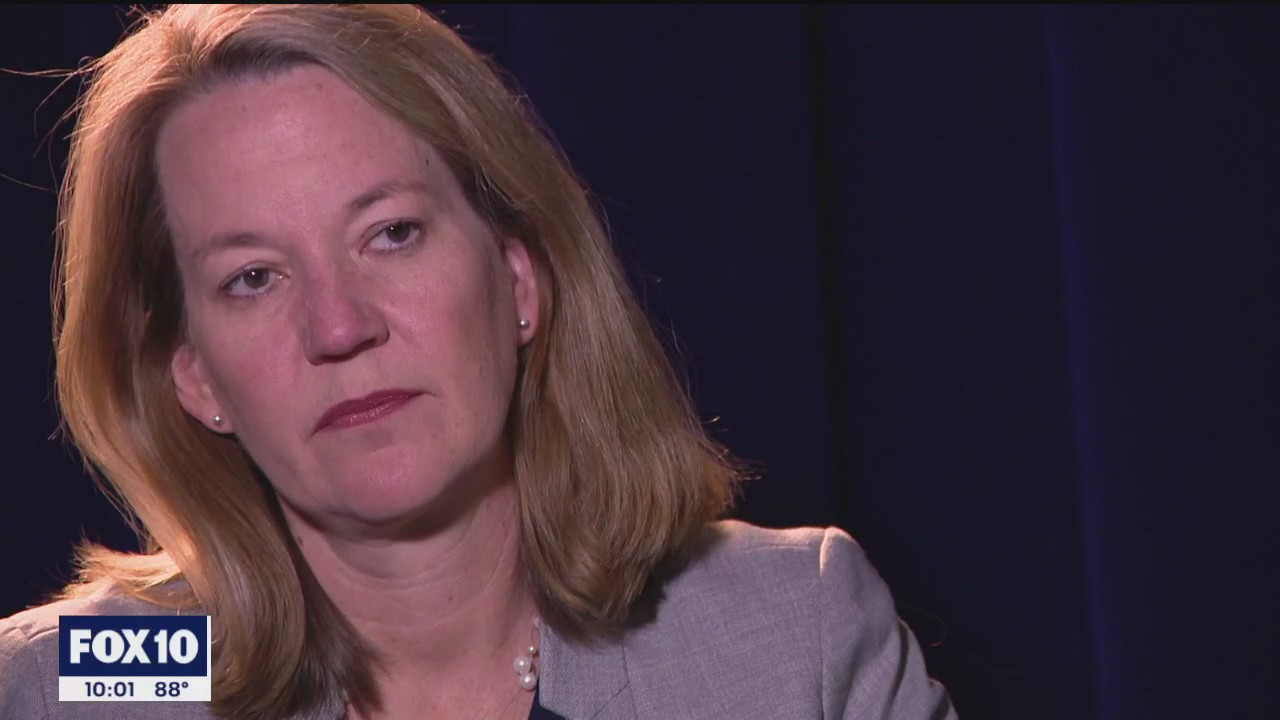Arizona's tribal members find unmarked graves in search for loved ones amid sober living crisis
PHOENIX - Losing loved ones to a sober living scheme plaguing the Indigenous community – a story many Native Americans share right now in Arizona.
Organizers of fake rehab centers are defrauding the state’s Medicaid system for at least hundreds of millions of dollars.
Based on a conversation with Arizona's Attorney General Kris Mayes, the number of stolen funds may be even larger than previously thought.
Meanwhile, there are families searching for missing people who are already dead.

Loved ones found in unmarked graves amid sober living crisis
Losing loved ones to a sober living scheme plaguing the Indigenous community ? a story many Native Americans share right now in Arizona. There are families searching for missing people who are already dead. "When my family went to find his grave, it was just a number."
‘How many of our people are out there just buried?’
Raquel Moody is a member of the Apache tribe. She doesn't hide the fact that she’s struggled with addiction.
So did her cousin, Carlo Walker.
"He struggled with his own addiction and back in November we had a conversation, and I was upset with him because he was drinking in one of the houses," Moody said.
She's referring to a sober living home where Walker was believed to be staying until he went missing last year.
It’s still hard to talk about for her.
Moody and other family members looked for Walker throughout the Valley back in February, but a simple Google search led to tragic news.
Walker died last December.
Moody learned that Maricopa County’s Indigent Decedent Services handled the burial since Walker’s next of kin had no idea he was dead.
"When my family went to find his grave, it was just a number. He had no name. Just his case number on PVC pipe and that made me wonder, how many of our people are out there just buried?" Moody said.
She's been in the sober living system herself and says she’s stayed in several different houses.
"The first thing they ask for is your AHCCCS number, your birthday, your name, first and last and food stamps," she said.
AHCCCS stands for Arizona Health Care Cost Containment System.
CLICK HERE FOR MORE FOX 10 REPORTS ON THIS ISSUE
‘… a complete and total overhaul’
So far in 2023, AHCCCS has suspended payments to more than 150 registered Medicaid providers. That includes sober living homes, behavioral health residential facilities, and outpatient treatment centers.
The crackdown comes after what AG Mayes calls one of the greatest scandals in the history of the state’s government.
"And I said, ‘My God, are you serious?’ and that’s when I became aware of it and started digging into it," Mayes said in an interview with FOX 10.
What Mayes learned from her health care fraud and abuse team is that fake rehab centers are fraudulently billing AHCCCS for therapy services not actually being provided to Native Americans in need.

Arizona Attorney General Kris Mayes
Instead, tribal members and other vulnerable groups of people are bribed with alcohol, drugs and cash to stay in these homes.
"These sober living homes became entrenched in our communities. It became an entrenched part of our state and what’s shocking is, it was mostly fraudulent," Mayes said.
The crisis is now a top priority for her.
"This is something that I wake up thinking about every day," the attorney general said. "It’s something I literally work on every single day."
Does she think AHCCCS needs a total overhaul of its system?

Arizona AG will explore human trafficking statute in connection to sober living scheme
So far in 2023, AHCCCS has suspended payments to more than 150 registered Medicaid providers. That includes sober living homes, behavioral health residential facilities, and outpatient treatment centers. The crackdown comes after what AG Mayes calls one of the greatest scandals in the history of the state?s government.
"I actually do. I think AHCCCS needs a complete and total overhaul, at least of its computer systems," she answered. "AHCCCS's computer systems are antiquated. They need to be updated. We need constant vigilance with regards to these billing codes and I am committed to making sure those billing codes stay shut."
A spokesperson with AHCCCS says there are now thresholds for behavioral health billing to deny claims for multiple services that should be billed on the same day.
Mayes believes the amount of Medicaid fraud has already cleared hundreds of millions of dollars.
"I don’t think it’s outside the realm of possibility that the number could top a billion dollars in fraud," she said.
One tactic is "ghost billing."
Mayes says seven to eight thousand people have been impacted. Some didn’t even live in facilities while their names and AHCCCS information were sold to bad actors and were used to bill the state.

Carlo Walker
"No compassion, no heart. Just awful," Moody said.
She hopes people see the faces of those victimized by the scheme, like her cousin Carlo Walker.
"I miss him so much. He was a good guy. He was a funny guy," she said.
Mayes says she wants to prosecute the bad actors found responsible for health care fraud, but so many victims are picked up in vehicles and moved from home to home across the Valley.
Is human trafficking involved?
"I can’t think of anything this bad," Mayes remarked.
With all of these suspensions, why are scammers still recruiting these innocent people? What will get the message across?
Mayes replies, "I don’t know. I think that at some point the fact that they aren’t going to be able to bill will get the message across. I think some people believe, some of these fraudsters believe, somehow that they’re gonna find an end run, and they’re gonna find a way into AHCCCS somehow because they believe it, because they got away with it for three years or more."
Currently, AHCCCS is conducting an audit of its own system, but since the 2019 fiscal year, Mayes says the growth of a certain outpatient clinic billing code alone is exponential.
From $53.5 million to $132 million in 2020, $291 million in 2021, and $668 million in the last fiscal year.
How much of $1.1 billion is actual fraud? It’s hard to quantify how many fraudulent facilities are in the Phoenix metro area.
"The city of Goodyear believes that they have north of 119 sober living homes in Goodyear alone," Mayes said.
There are easily hundreds of these homes across the Valley, she says.
More police departments are contacting the AG's office regarding how to prosecute fraudsters.

Recruits are approached by vans and vehicles of all types, even rental cars – usually unmarked.
Is there potential for human trafficking charges in some cases?
Mayes answers, "We are examining that question here at my office. I’m going to look at the human trafficking statutes and determine whether any of them are appropriate for a given instance of fraud or given particular instance of these sober living homes."
She says the U.S. Attorney’s Office is exploring the same statute.

Related: Arizona takes on sober living, Medicaid fraud
The state of Arizona is cracking down on an alleged Medicaid fraud and a scheme that takes advantage of vulnerable Native Americans. On May 16, Arizona Governor Katie Hobbs announced new actions to stop fraud and abuse just months after FOX 10's investigative series "Preying on a People" took a deep dive into the actions of unlicensed sober living homes targeting Native Americans.
For now, getting to the root of the crisis is another issue.
Mayes says there’s a clear lack of resources on tribal land for those fighting addictions.
"We need more services on or near the Navajo Nation, on or near White Mountain Apache, on or near Tohono O'odham, so people can get legitimate services where they live," the AG says.
Mayes says she’s well aware of hotels and short-term rentals being used as fraudulent sober living homes. It's not happening only in traditional homes.
If you know a victim in need of resources, the state has provided a hotline. Dial 2-1-1 and press 7.
Operation Rainbow Bridge also has a hotline and it can be reached at 1-855-HELP-ORB.
If you have any tips on possible fraud, you can report it by filling out the form at https://www.azahcccs.gov/Fraud/ReportFraud/onlineform.aspx

